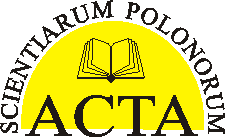Title
The effect of the period of weed control and differentiated nitrogen fertilization on yielding of white head cabbage
Autor
Eugeniusz Kołota, Piotr Chohura
Keywords
white head cabbage, term of weed removal, N-fertilization, yield, plant composition
Abstract
In the field experiment with cabbage cv. ‘Menza F1’ fertilized with 150 and 250 kg N·ha-1, the first weeding started 3, 6, 9, 12 weeks after transplanting, including unweeded control. Higher dose of nitrogen especially in treatments with delayed weed control affected in significant increase of marketable yield, as well as the mean weight of cabbage heads in comparison to the dose of 150 N·ha-1. The highest yielding was recorded in treatment where the first weeding was conducted 3 weeks after transplanting. The delay of this operation to 6, 9, and 12 weeks after transplanting caused the decrease in marketable yield by 16.0%, 33.1% and 48.4%, respectively. The dose of 250 N·ha-1 contributed to the slight decrease of dry matter, total and reducing sugar contents, and higher accumulation of nitrates in edible parts of cabbage heads. Late start of weed removal was disadvantageous for dry matter and sugars content and caused higher nitrates accumulation in cabbage.
Pages
83-89
Cite
Kołota, E., Chohura, P. (2008). The effect of the period of weed control and differentiated nitrogen fertilization on yielding of white head cabbage. Acta Sci. Pol. Hortorum Cultus, 7(1), 83-89.
Full text


